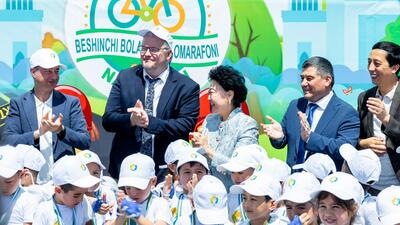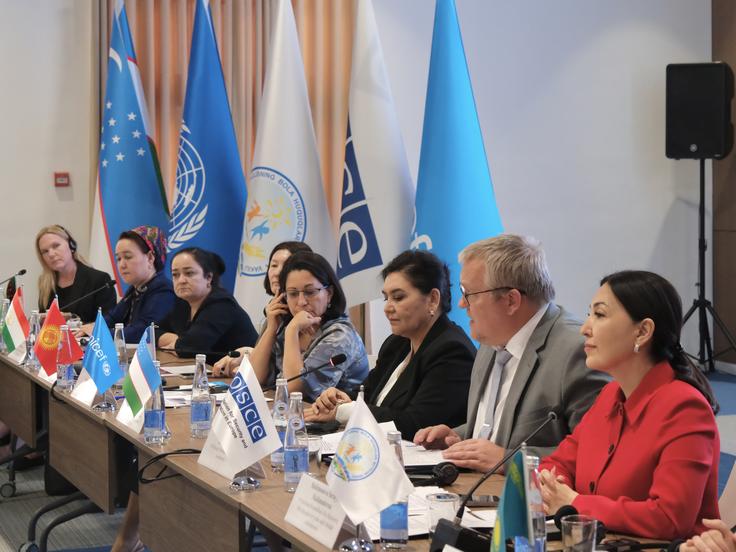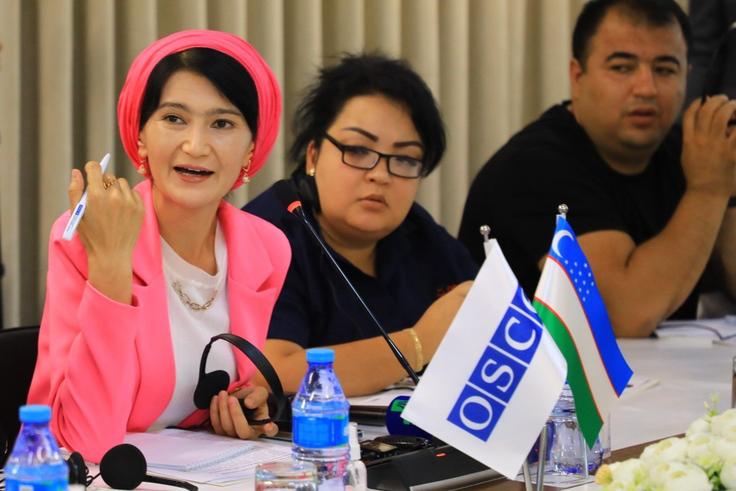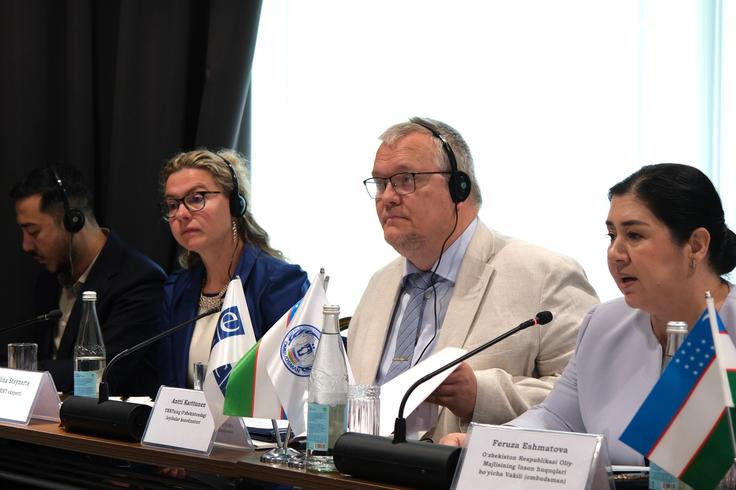Our work

The OSCE Project Co-ordinator in Uzbekistan implements projects aimed at the promotion of the rule of law, good governance, human rights, gender equality and media development; the prevention of terrorism, violent extremism and other transnational threats; the advancement of economic and environmental sustainability; and the encouragement of youth engagement, education and civic participation.

Cyber security
Assistance in enhancing cyber/ICT security and countering cybercrime
Uzbekistan’s digital ecosystem has evolved rapidly since the government embarked on its ambitious national economic and government reform agenda. This has led to a rise in cyber-dependent crime. The Project Co-ordinator organizes capacity-building activities for the representatives of law enforcement agencies to advance their skills on cyber security tools needed to identify and prevent cyber-attacks, on methods to investigate crimes committed online, and on the specifics of collecting and analysing data on cryptocurrency transactions used for criminal purposes.

The “National Cyber Incident Classification” workshop for representatives of participating States from Central Asia and South Caucasus as well as from Mongolia in Tashkent
Combating human trafficking
Training government agencies and women's rights groups on anti-trafficking strategies
The Project Co-ordinator focuses on capacity-building for Uzbekistan’s interagency anti-trafficking commissions and other governmental agencies, and on running training courses for women’s rights groups and the National Federation of Trade Unions to empower groups that are at risk of becoming victims of trafficking. Other activities include awareness-raising projects and workshops for law enforcement officials and non-governmental organizations on how to better ensure the rights of trafficked persons.

Training on Applying Child-Friendly Approaches in Investigative Interviewing of Child Victims of Sexual Violence an Trafficking
Countering terrorism
Assisstance to prevent and fight terrorism
The Project Co-ordinator provides assistance in the implementation and evaluation of the National Strategy of the Republic of Uzbekistan on Countering Extremism and Terrorism for 2021–2026, promoting human-rights compliant national policies and building the country’s capacity to prevent and fight terrorism, including violent extremism and radicalization that lead to terrorism (P/CVERLT). Through the organization of capacity-building activities, the Project Co-ordinator aims to promote the exchange of information, facilitate co-operation and familiarize stakeholders with best counter-terrorism and P/CVERLT prevention practices. The activities are also aimed at further enhancement of the role of women and youth as actors in preventing and countering violent extremism, forming a sustainable immunity to extremism and terrorism ideology among youth and improved collaboration between law enforcement agencies and civil society institutions.
The First Regional Expert Council Meeting in Central Asia on Rehabilitation and Reintegration of Returnees: “Cooperation for Peace and Security”
Economic development
Empowering women and youth through digital inclusion for economic growth
With information and communication technology and digitalization providing emerging economies with great opportunities to boost economic growth, the Project Co-ordinator aims to bridge the digital divide and catalyse inclusive economic growth in Uzbekistan. Our initiatives are designed to empower women and youth, especially in rural and suburban areas, by enhancing their digital capabilities, improving widespread access to technology and creating avenues for economic prosperity.
Recognizing the pivotal role of digital skills in unlocking individual potential and contributing to national economic development, we provide capacity-building programmes on computer literacy, e-commerce, digital technologies and IT entrepreneurship. Through these training opportunities, beneficiaries have acquired essential digital competencies, contributing to the human capital development crucial for a secure and resilient society.
For example, more than 1,000 women have participated in IT training programmes delivered in Bukhara, Surkhandarya, Syrdarya provinces and the Republic of Karakalpakstan between 2022 and 2025. Similarly, around 2,000 young people from Samarkand, Ferghana, Khorezm and Bukhara provinces have benefitted from the youth start-up incubation programmes organized in recent years.
Participants of the training courses on IT and e-commerce in Karakalpakstan
Environmental security
Advancing environmental security through sustainable development practices and climate action
While Uzbekistan is implementing significant socio-economic and political reforms, the country has to effectively address global environmental challenges such as climate change, environmental degradation and biodiversity loss. The development of robust frameworks and tools for sustainable practices is especially essential since Uzbekistan remains highly vulnerable to the impacts of these environmental challenges.
The Project Co-ordinator has been supporting the government of Uzbekistan in advancing environmental security through sustainable development practices and climate action. We focus on strengthening the country’s capacity to promote sustainable resource management and improve climate resilience and environmental governance. Our activities include capacity-building initiatives for national stakeholders on climate adaptation and mitigation, supporting the integration of green economy principles and raising awareness of environmental issues through public engagement and education.
Expert support in developing a master’s degree programme, conducting a climate-related data mapping exercise and developing the terms of reference for Uzbekistan’s Climate Data Hub are among many of our tangible contributions made in recent years. The Project Co-ordinator also supports efforts on the sustainable management of natural resources through initiatives on environmental monitoring missions to assess the water pollution levels of cross-boundary waterways and biodiversity rehabilitation activities in the Aral Sea basin.
OSCE PCUz supported an autumn biodiversity monitoring expedition in the Aral Sea region
Good governance
Assisting in enhancing institutional frameworks for combating corruption, tackling illicit economic and financial activities and increasing transparency
By strategically addressing the challenges of corruption and the shadow economy, enhancing the openness and accountability of public authorities, and developing frameworks for effective data governance, the Project Co-ordinator has supported transformative changes that contribute to the long-term socio-economic stability and security of Uzbekistan. Through targeted interventions, capacity-building initiatives, international best practices exchanges and collaborative partnerships, the Project Co-ordinator seeks to empower government institutions for a transparent, accountable and resilient governance framework that is responsive to the public and conducive to inclusive development.
In recent years, the Project Co-ordinator has contributed to Uzbekistan’s accession to the Hague Conference on Private International Law, the country’s adoption of the International Open Data Charter, the launch of the National Openness Index in Uzbekistan, as well as the drafting of a number of legal and policy documents.
Participants of the workshop on strengthening use of open and gender data across government agencies
Human rights
Assisting the country in implementing its human rights commitments
In co-operation with the country’s parliamentary Ombudsperson and the National Human Rights Centre, the Co-ordinator assists Uzbekistan in implementing its human rights commitments. This entails capacity-building training for the Ombudsperson institution’s staff and a project to strengthen the skill set of the Human Rights Centre’s staff in the use of international human rights norms and standards. The Project Co-ordinator also organizes training for personnel at penitentiary facilities and supports the Human Rights Resource Centre, a teaching facility at the Interior Ministry Academy.

The First International Forum of Central Asian Commissioners for Children's Rights in Tashkent
Media freedom and development
Improving the quality of radio and television
Projects in this area focus on strengthening the professional skills of the press services of government agencies and civil society organizations, familiarizing journalists with best practices in reporting on court proceedings and legal issues, and facilitating a constructive engagement between media and state institutions.

Training courses for journalists and court employees organized by OSCE PCUz in co-operation with the Supreme Court
Policing
Training and professional development of Uzbekistan's police

A series of thematic webinars on trends in contemporary policing for the Academy of the Ministry of Internal Affairs of the Republic of Uzbekistan
Rule of law
Judicial and legal reform in Uzbekistan
Judicial and legal reforms, as well as modernizing the education of legal practitioners, are at the core of the Project Co-ordinator’s rule of law-related activities in Uzbekistan. Working with local and international partners, the Project Co-ordinator runs training seminars for judges, defence lawyers, law teachers and legal services of the state authorities on issues that include judicial ethics, e-justice, international fair trial standards, and good practices for the selection and appointment of judges.

Workshop organized by OSCE PCUz together with the Ombudsperson of the Oliy Majlis of Uzbekistan to strengthen the capacity of civil society and national human rights institutions to monitor detention facilities
OSCE in action
The Organization’s work and teams in related fields
The OSCE’s work is based on a comprehensive security concept, encompassing 23 fields of work. Learn more about the Organization’s activities and teams working in fields relevant to the Project Co-ordinator in Uzbekistan.